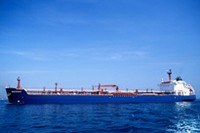New convention improves marine working environments
Shipping is the most global of all businesses. One reason for introducing a new Marine Labour Convention is to create a more even playing field for the shipping companies. Shipowners should no longer be able to save money by cutting wages or neglecting the working environment.
1.2 million shipping industry workers stand to benefit from the new Marine Labour Convention which comes into force in 2011. Det Norske Veritas, DNV (one of the world's three major classification societies) has issued the first certificate for a vessel which fulfills the new convention.
"So far we've got time on our side, but soon time will be against us," says DNV's Georg Smefjell. He estimates the classification society will issue 6 to 8,000 certificates which will prove shipping companies meet the new standards on working environment and conditions on board their vessels.

The first vessel to pass the new inspection was the tanker Seacrown, owned by Greek shipping company Thenamaris.
"There will be many inspections in the months to come, and shipping companies shouldn't wait too long to make sure their vessels pass the test in time," says Georg Smefjell.
The fourth pillar
The Marine Labour Convention (MLC) is described as the fourth pillar in the drive to improve the quality of international shipping. Three other conventions focus on safety and vessel emissions.
The new MLC updates 65 international labour standards, introduced over the past 80 years.
"Many groups of workers who used to fall outside the marine conventions are now included," says Georg Smefjell.
Earlier only those working on deck or in engine rooms were covered by the regulations. The new convention uses the term seafarers, which includes service personnel, chefs and other professions.
The Marine Labour Convention lays down an international standard on nearly every aspect of marine labour - from the minimum working age to how long you can work. Employers must offer medical check-ups and take responsibility for medical services and carry the cost of sickness leave. There are new rules on noise and vibrations affecting the working environment, none of which existed in previous international agreements.
"Swedish shipping companies already meet most of these demands. But these new rules mean big improvements to the international standard for marine working environments," says Mikael H Andersson, a former sea captain who is now a senior administrative officer at the Swedish Transport Agency.
"No under-16s are allowed to work at sea, there must be 2.5 days paid leave each month and there are very clear rules on rest and working hours."
Shipping is the most global of all businesses. One reason for introducing a new Marine Labour Convention is to create a more even playing field for the shipping companies. Shipowners should no longer be able to save money by cutting wages or neglecting the working environment.
Inspection rights
"The strength of this convention lies in the fact that every member state that has ratified it has a right to inspect any vessel in their ports, irrespective of whether or not the country to which the vessel is registered has ratified the convention," writes Johan Franson, who has studied what the convention will mean for Swedish shipping on behalf of the authorities.
Shipping companies that already carry DNV or other classification society certification only need to do some slight adjustments. Shipping companies that don't have such classification will most likely be inspected.
If an inspection shows a foreign vessel to be in breach of the convention because conditions onboard present a clear danger to seafarers' health or safety, the inspector will make sure the vessel does not leave port before the breaches have been rectified.
- The Marine Labour Convention:
-
Norway was the first signatory to the Convention. Sweden is expected to sign before the end of the year.
30 nations representing at least 33 percent of the global shipping fleet must ratify the Convention in order for it to come into force. There is already enough tonnage as major shipping registers like Panama, Liberia, and Bahamas have ratified the Convention.
The EU Commission has asked member states to ratify the Convention by the end of this year.
 Follow us on Facebook
Follow us on Facebook
